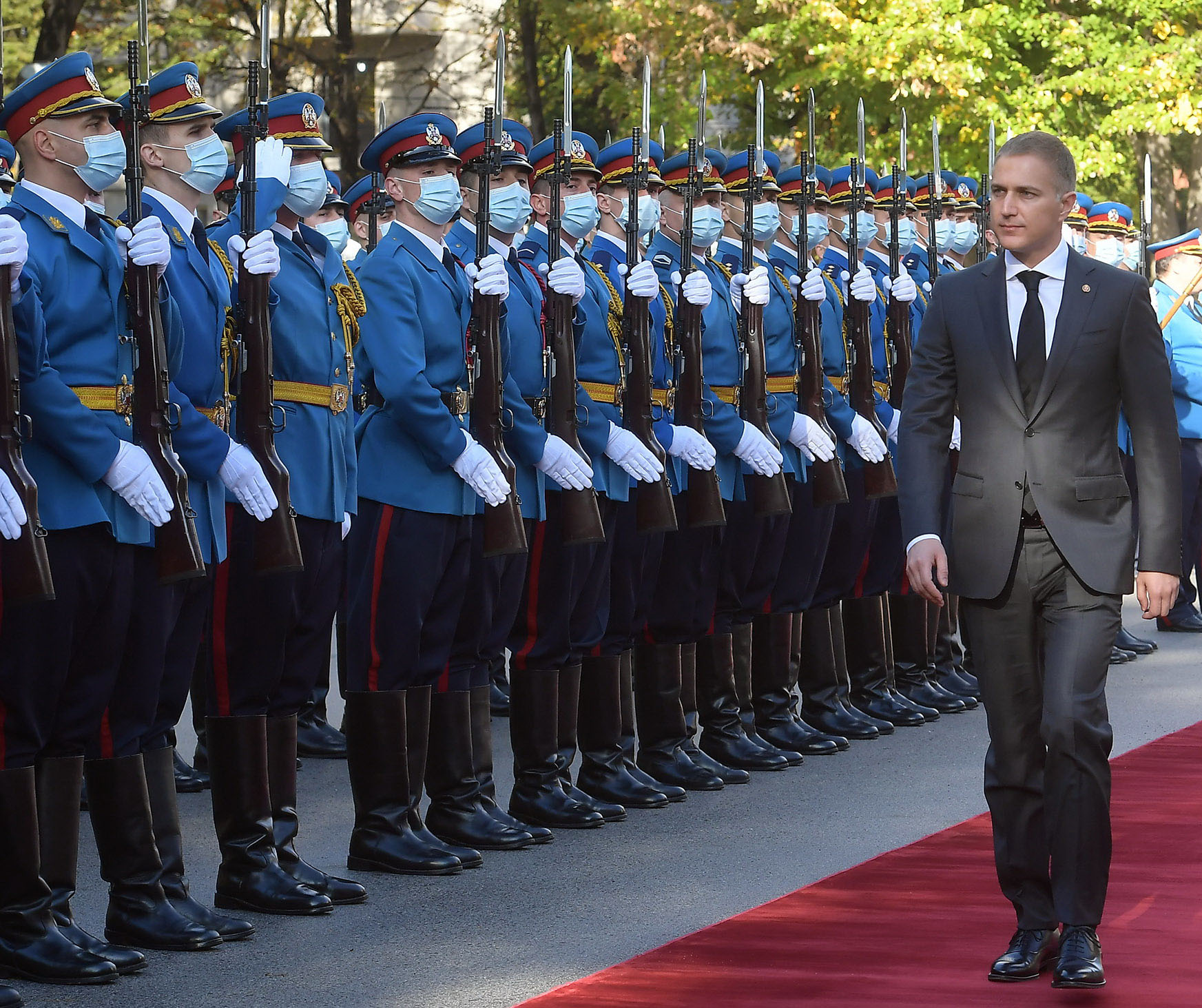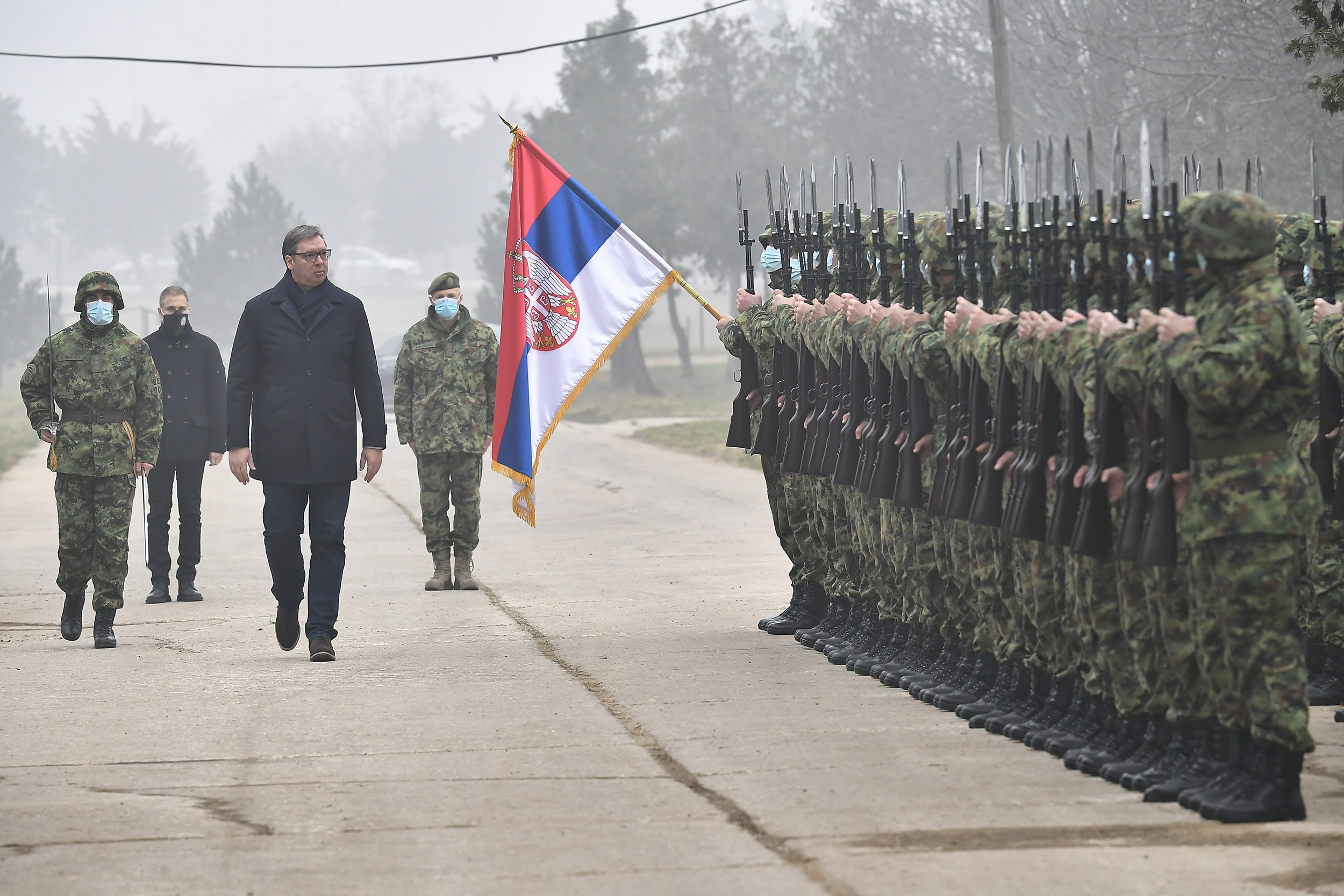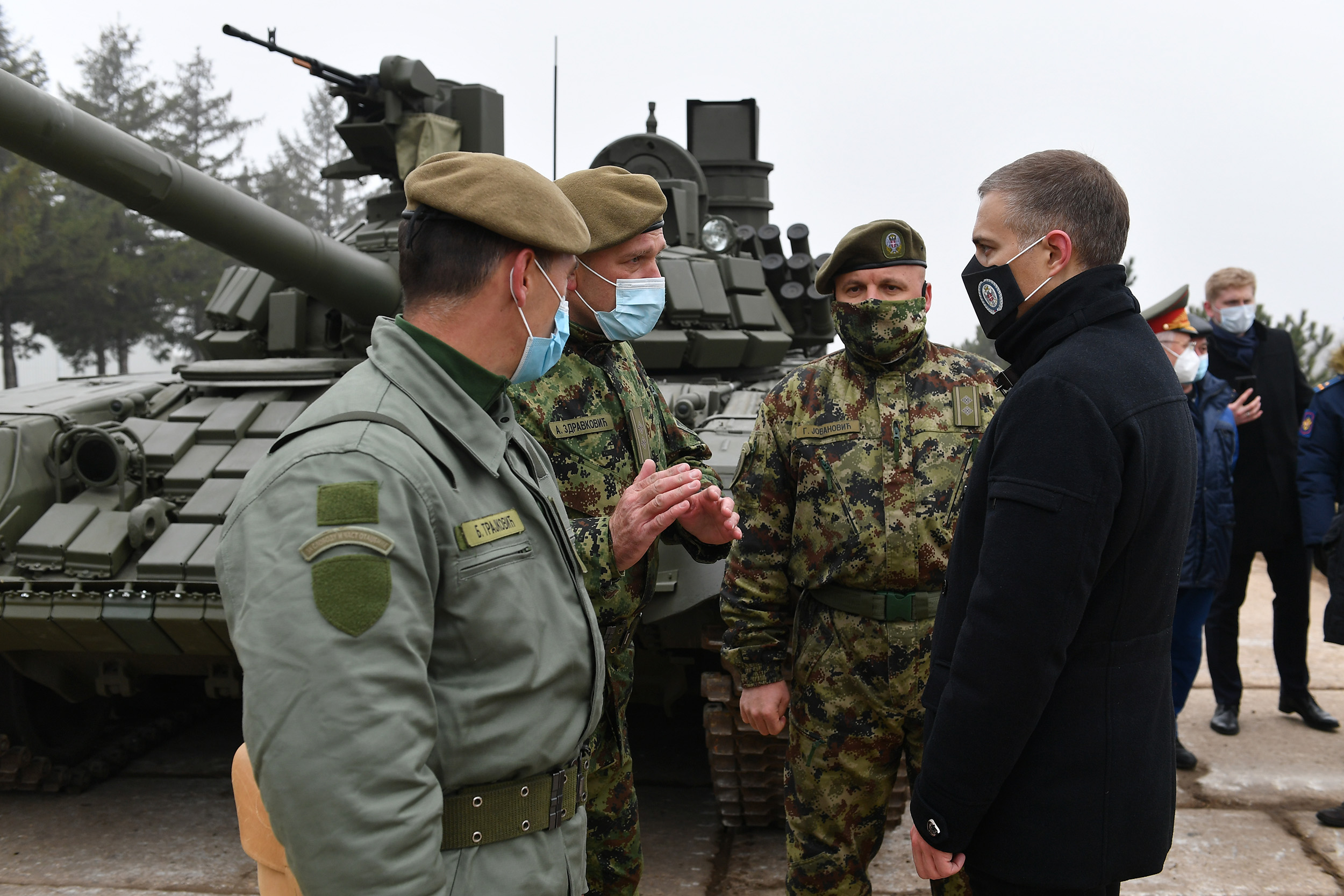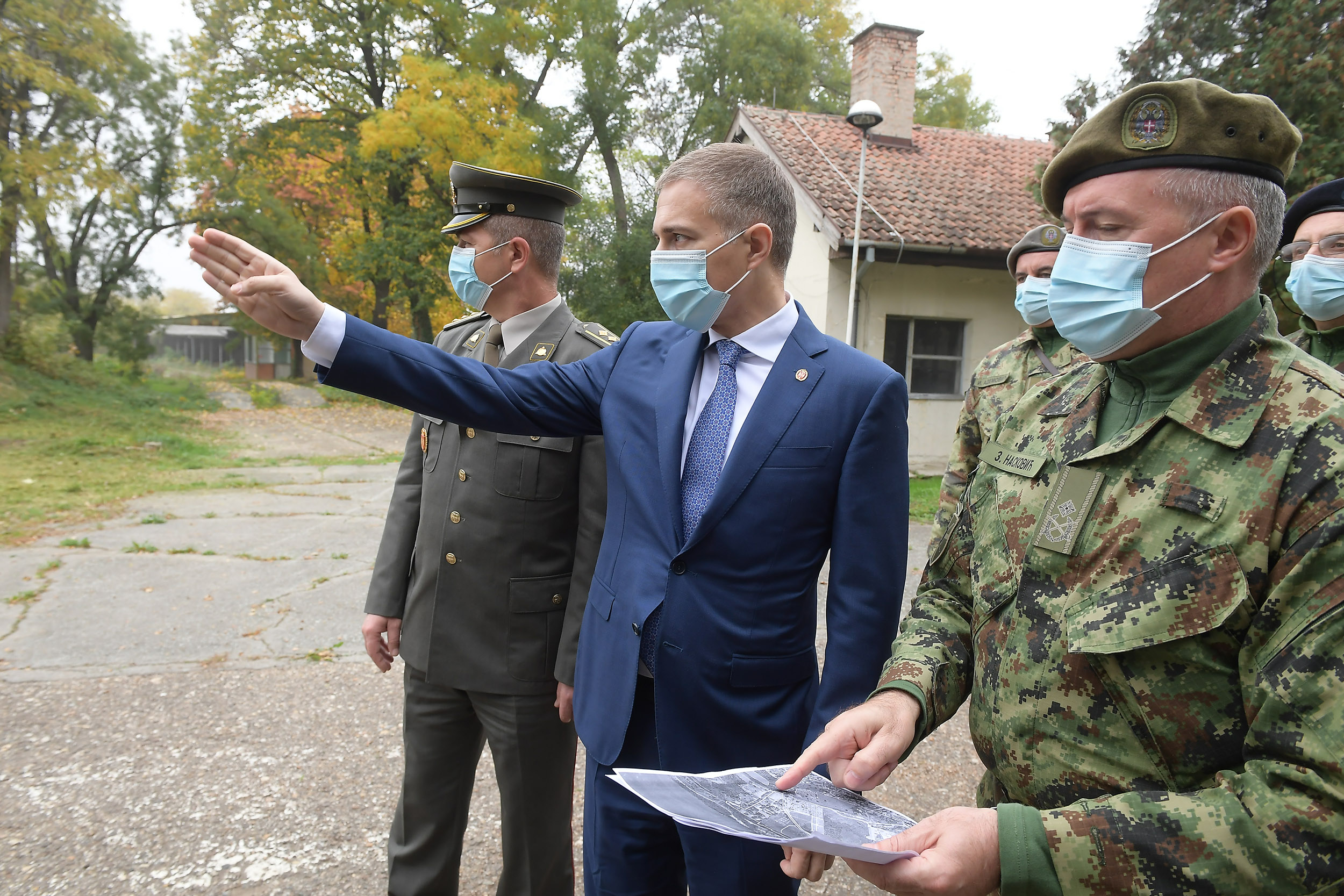03.12.2020.
Interview with Deputy Prime Minister and Minister of Defence Nebojša Stefanović, PhD, for "Odbrana" magazine
Only strong armed forces and a strong state can be neutral. Our job is to support, through our work and engagement, Serbia's strategic decision to be neutral, to rely on itself, to be a sovereign and independent state that makes its own decisions, and for its armed forces to be capable enough of being a guarantor of citizens' security. So that everyone knows that the Serbian Armed Forces can fulfil every task assigned to them and be a bulwark against all security threats, from the classic, military threats to modern cyber threats.
It is clear from the first steps taken by the Minister of Defence, Nebojša Stefanović, PhD, since he took office on 29 October, that he has taken the road towards further improvement of the situation in the Serbian Armed Forces. We are talking about the key sections of that road.
 Mr Stefanović, what are the most important goals you have set for yourself?
Mr Stefanović, what are the most important goals you have set for yourself?– To continue equipping our armed forces, investing in them and improving our service members’ standard of living. I laid out my plans and vision of development in the coming period to the President of the Republic and the Supreme Commander of the Serbian Armed Forces Aleksandar Vučić, and what I think must be the focus of our work so that we can be more efficient in implementing modernization, overhaul and enhancement of our armed forces’ overall combat readiness, as it used to be called.
The service members’ standard of living has always been an important issue for the minister.
- In addition to modernizing weapons, one of the most important things we want to do in the coming period is to improve the soldiers’ standard of living. I talked to the President about an additional salary increase, besides the five percent salary increase that the state has already planned, which, given the range of salaries, will improve the standard of living of soldiers and non-commissioned officers slightly more than that of the officers. We need to work on improving the standard in order to encourage people to join the military, but also in order to keep our service members. An important segment is the procurement of new uniforms, boots and equipment, the things that are important for every soldier and, of course, equipping our special and all other units.
 When it comes to equipping, will we continue to rely on domestic production capacities, combining them with purchases of foreign equipment?
When it comes to equipping, will we continue to rely on domestic production capacities, combining them with purchases of foreign equipment?– I saw that there was a lot of investment in the previous period. It is necessary to start these investment cycles even more energetically. We have decided that domestic industry, our own engineers, should be the ones to fulfil the General Staff and the Ministry of Defence’s vision regarding the equipping of the armed forces. However, it is necessary to speed up the processes. I think we need to produce the weapons needed by the armed forces faster. Producing only a few per year is not enough. It is important for our industry to be capable of developing our own weapons and for us to be able to procure the things that our armed forces need in our country, and not to depend on foreign countries, but to increase our own capacities.
How important is all this for maintaining the concept of military neutrality in the future?
– It is extremely important. Only strong armed forces and a strong state can be neutral. Our job is to support, through our work and engagement, Serbia's strategic decision to be neutral, to rely on itself, to be a sovereign and independent state that makes its own decisions, and for its armed forces to be capable enough of being a guarantor of citizens' security. So that everyone knows that the Serbian Armed Forces can fulfil every task assigned to them and be a bulwark against all security threats, from the classic, military threats to modern cyber threats.
It is obvious that you have started an intensive international cooperation by holding a number of meetings with ambassadors of Spain, the Netherlands, United Kingdom, Kazakhstan, the Russian Federation, the Islamic Republic of Iran, Hungary, Italy, Poland, France, Germany, USA ... What is the common denominator in these meetings?
– It is a common thing for ambassadors to come to meet the new minister at the beginning of his or her term, although I’ve met some of them before, but this is a new department. They want to get acquainted with Serbia’s strategic vision related to defence, and I want to hear their view of international cooperation, as representatives of their countries. The point of these talks is to determine what we can do in the coming period and how they can help the Republic of Serbia in its goals, these being military neutrality and at the same time modernizing our equipment. Joint participation in peacekeeping missions is, of course, one of the most important segments of these talks, as well as the improvement of bilateral cooperation in terms of military health care, military education and joint exercises.
 How important is our participation in the EU peacekeeping operations for the Serbian Armed Forces, but also for the Republic of Serbia? What is the future of our participation in peacekeeping operations?
How important is our participation in the EU peacekeeping operations for the Serbian Armed Forces, but also for the Republic of Serbia? What is the future of our participation in peacekeeping operations?– What is important about participating in these missions is the opportunity for our soldiers to undergo intensive training and gain experience in real-life situations. Of course, they also have a certain political significance, because the reputation of our armed forces and the Republic of Serbia is growing due to our engagement in those missions and the good results that our soldiers achieve. I have to thank the General Staff, because our soldiers who go on these missions are more than ready and dedicated, they proudly represent the Republic of Serbia and leave a great impression wherever they go. In these thirty days, in the aforementioned meetings with foreign ambassadors and military attaches, I’ve heard nothing but good things about our participation in these missions, and thus about our contribution and Serbia’s growing global reputation.
Serbian Armed Forces are heavily engaged in their third mission – providing assistance to citizens. The military health care has recently employed 136 medical workers. What else can be done to reinforce military health care?
– We will continue to hire new doctors and medical staff in the coming period. As I have already said, one of the goals is investment, including investment in increasing the military health care capacities, whose importance has been proven again during the Covid epidemic. We are thinking about improving the infrastructure, starting with the renovation of the Military Medical Academy, but we are also thinking of renovating other facilities owned by the Ministry of Defence and the Serbian Armed Forces, including the barracks.
Shortly after your visit to the exhibition "War Image of Serbia in the Second World War" in the Central Military Club you met with the Minister of Culture. A joint project has been announced to refurbish the facade of the Veteran’s Club building...
– I would like to thank Minister Maja Gojković once again for recognizing the need to invest in military facilities that are not directly related to the execution of military tasks, but are important for preserving the military tradition, for our history and culture. Only through joint efforts can we make our cities and our country better. One of the goals I have set for myself is to consider what we can do about the Military Museum in Belgrade next year. I think that our Military Museum is a treasure that is underutilized and that we need to do much more for it in the coming period.
 You also visited the "People's Hero Janko Čmelik" barracks in Novi Sad, where you did your military service in the then 12th Signal Battalion. What memories do you have of your time in the military?
You also visited the "People's Hero Janko Čmelik" barracks in Novi Sad, where you did your military service in the then 12th Signal Battalion. What memories do you have of your time in the military?– I have nothing but fond memories of my days in the military. I am still in touch with some of the friends I made in the military. Probably like everyone else, I learned things about the military that I hadn’t known before and made some new friends. I believe that it is a useful experience for young people, in terms of gaining discipline and developing a sense of community.
The physiognomy of war and defence has changed significantly in the modern world. The latest conflict between Armenia and Azerbaijan over Nagorno-Karabakh has shown the true face of the new war. Based on that, what kind of armed forces do you think Serbia needs today, what kind of training, weapons, equipment?
– All the conflicts in the modern world have shown that countries need efficient, fast armies with state-of-the-art equipment. It has been clearly shown that they have the advantage in every situation, both in the defence of their country’s territory and, of course, in all the tasks assigned to them by their country. When it comes to our country, Serbia has a clear vision of its armed forces and defence, which is defined by strategic documents, and of course, by what the General Staff envisages when it comes to equipping the armed forces and improving their potentials.

